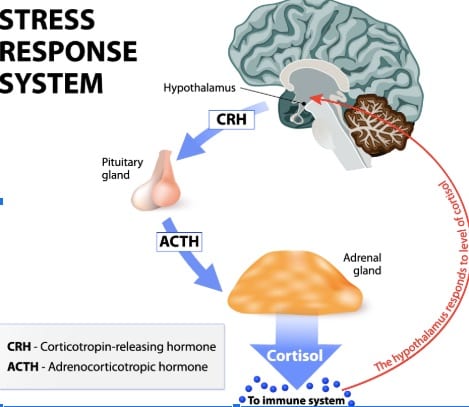If you don’t think your anxiety, depression, sadness, and stress impact your physical health, think again.
All of these emotions trigger chemical reactions in your body, which can lead to inflammation and a weakened immune system.
Learn how to cope, sweet friend.
There will always be dark days.
– Kris Carr, author & health advocate
Stress is a non-negotiable part of life.
We often can’t control life events or the actions of others but we can always control our own reactions and perceptions.
It’s easy to get caught in the whirlwind of daily challenges, demands, and rising stress levels.
We can get so caught up in chasing our goals, crossing off our to-do lists, and achieving that we become accustomed to operating in fight or flight response most of the time.
Our bodies are wired for both short term stress and long term recovery and function best when we’re in a balanced state of both.
Most of us, however, are living in a state of chronic stress and long-term stress without even realizing it.
Being stressed out most of the time with stress hormones flooding our bloodstream negatively impacts mental health and even our immune response. (1)
In fact, chronic inflammation is one of the lesser-known side effects of stress.
An unmanaged inflammatory response can also be a risk factor for other more serious conditions such as cardiovascular disease/ heart disease, autoimmune disease, and even cancer.
Emotions, Stress, & Immunity:
Psychological stress and unmanaged emotions weaken your defenses and compromise your immune system.
The human immune system is dampened during periods of acute stress because during those intense moments the body grabs energy from all other non-vital systems in order to be able to fight or flee.
This means that immunity is temporarily shut down in order to tend to the immediate threat.
Older adults experience a decline in immune function.
In fact, there’s an entire field dedicated to studying the interactions between mind, emotions, the nervous system, and the immune system.
It’s called psychoneuroimmunology.
Psychosomatic medicine is an interdisciplinary field that explores the relationship amongst one’s mental health, behavioral factors, and social factors on bodily function and quality life.
Health psychology is the study of psychological and behavioral processes in health, disease, and healthcare.
It aims to understand how psychological, behavioral, and cultural factors contribute to physical health and illness.
Immunity, Your Nervous System, & Your Gut:
When the HPA Axis (one of the main systems involved in the stress response) and Autonomic Nervous System (ANS) are activated in response to real or perceived threats, and your bloodstream is pumped with hormones like cortisol and epinephrine (adrenaline) your heart rate increases, your breathing quickens, and your blood pressure increases.
Elevated cortisol halts “non-urgent” body functions during this time.
The digestive system is suppressed.
Your reproductive/sexual function too.
And there is no space for your growth and regenerative processes either.
Elevated cortisol levels also alter immune function:
“The immune cells are being bathed in molecules which are essentially telling them to stop fighting,” explains Dr. Esther Sternberg, whose book The Balance Within: The Science Connecting Health and Emotions explains the science of mind-body interaction in illness and healing.
If you’re dealing with anxiety in any way, and aren’t properly channeling that nervous, worrisome energy or you’re constantly having to “put out fires,” your stress response will remain activated.
Prolonged activation of the stress response creates ripple effects in the body: your anxiety levels become harder to manage, you have trouble sleeping, you can’t focus or think clearly, you’re more prone to catching common colds and other dis-eases, and you may gain weight without altering your eating or exercise habits.
Approximately 70% of your Immune System is in your GUT.
To add to this, our gut microbes also play a role in our immune function:
“Gut microbiota interacts with both innate and adaptive immune systems, playing a pivotal role in the maintenance and disruption of gut immune quiescence. A cross-talk between the mucosal immune system and endogenous microflora favors a mutual growth, survival and inflammatory control of the intestinal ecosystem.” (2)
Do These 5 Things To Boost Your Immunity Today:
Increasing our ability to cope with stress by using behaviors and techniques that minimize the reactivity of the brain to stress can have a positive effect on your health and longevity.
– Dr. Bruce Rabin
1. Breathe
Apart from helping us destress and calm down, deep belly breathing can also help us fight germs, bugs, and any other potential invaders.
When we breathe intentionally, deeply, and with our lower belly we activate a muscle called the diaphragm.
This muscle is located above the gut and internal organs and below the lungs.
By activating this muscle we massage the internal organs and glands, which helps move lymph (fluid containing the immune system’s white blood cells) throughout the body to their targeted locations. (3)
2. Move your body
“Movement will give you access to joy that will dramatically improve the quality of your life, help support mental health, and create more meaning and belonging.”
– Kelly McGonigal, PhD
Bodily movement help with heart health and releases feel-good chemicals to counter stress.
It helps us release anxious energy so we can boost immune function.
3. Laugh
Don’t believe us? Google it!
It turns out that laughter can truly be excellent medicine!
Several studies have determined that sustained laughter and humor can indeed boost and strengthen the immune system by:
– increasing antibodies that help us fight off colds and bugs (4)
– increasing the activity of various immune system cells, including t-cells and white blood cells. (5) (6)
In one particular study led by Dr. Lee Berk from Loma Linda University, California, it was found that just the expectation of a good laugh or even watching a comedy movie or video had a double effect: (7)
1 – It lowered the levels of 2 stress hormones: cortisol (down 39%) epinephrine aka adrenaline (down 70%). (This is really important because raised stress hormones weaken immunity.)
2- Increased the levels of two hormones known to boost mood and immunity: beta-endorphins, which elevate mood (up 27%) human growth hormone aka HGH which helps to elevate immune function (up by 87%).
4. Spend time in nature
Japan’s been studying the physical and psychological effects of being in nature and as it turns out – trees, greenery, and fresh air are really great for our immunity.
In 1982 Japan launched a national health program called “Shrinrin-Yoku,” which means ‘taking in the forest atmosphere.’
It’s all about spending time in nature and “immersing” ourselves in mindful union with its surroundings.
No active stuff – no jogging, exercising – just quiet, mindful contemplation amongst the trees.
It’s been found that forest bathing helps boost our body’s count of natural killer cells (NK), thereby strengthening overall immune function. (8)
Breathing in the forest air and communing with nature was also found to lower stress hormones like cortisol. (9)
5. Strengthen your social network
“We can boost our immune systems by strengthening our social networks and decreasing stress.”
– Jane McGonigal, author
Social support and connection are crucial to our overall well-being but they also help flood the body with feel-good chemicals like oxytocin which boosts immunity.
Physical touch also helps keep you healthy so go ahead and cuddle hug, kiss, or get a massage!
Every negative experience holds the seed of transformation.
– Alan Cohen
REFERENCES
:
(1) https://www.nytimes.com/2002/12/17/science/the-heavy-cost-of-chronic-stress.html (New York Times)
(2) https://www.ncbi.nlm.nih.gov/pubmed/23426535
(3) Jahnke O.M.D., Roger (2013-07-02). The Healer Within: Using Traditional Chinese Techniques To Release Your Body’s Own Medicine *Movement *Massage *Meditation *Breathing (p. 40). HarperCollins.
(4) https://www.ncbi.nlm.nih.gov/pmc/articles/PMC2686627/
(5) https://www.ncbi.nlm.nih.gov/pubmed/12652882
(6) https://www.telegraph.co.uk/news/health/news/7635143/Laughter-really-is-the-best-medicine-as-doctors-find-it-can-be-as-healthy-as-exercise.html
(7) https://www.sciencedaily.com/releases/2009/04/090417084115.htm
(8) https://www.ncbi.nlm.nih.gov/pmc/articles/PMC2793341/
(9) https://www.ncbi.nlm.nih.gov/pubmed/19568835













